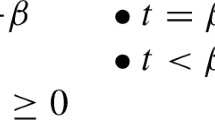Abstract
Whilst Bayesian epistemology is widely regarded nowadays as our best theory of knowledge, there are still a relatively large number of incompatible and competing approaches falling under that umbrella. Very recently, Wallmann and Williamson wrote an interesting article that aims at showing that a subjective Bayesian who accepts the principal principle and uses a known physical chance as her degree of belief for an event A could end up having incoherent or very implausible beliefs if she subjectively chooses the probability of an event F for which she has much poorer evidence. They also argued that their own version of objective Bayesianism is completely immune to that challenge. In this article, after having presented the strongest version of Wallmann’s and Williamson’s argument, I will show that if successful, it has far-reaching consequences and would not only invalidate moderate subjective Bayesianism and imprecise probalism but also a form of objective Bayesianism that relies on conditionalisation, the principal principle, reference classes, and the principle of indifference applied to the most basic partitions. I then argue that their argument can be defeated by adding the rule that it is always irrational to choose a probability that can be computed from the known probabilities associated to one’s other beliefs. I finally argue that the authors’ main intuition that probabilities have different degrees of reliability favours imprecise Bayesianism over precise Bayesianism.

Similar content being viewed by others
References
Benetreau-Dupin, Y. (2015). The bayesian who knew too much. Synthese.
Berkovitz, J. (2012). The world according to de Finetti: On de Finetti’s theory of probability and its application to quantum mechanics . In Probability in physics (pp. 249–280): Springer.
Bovens, L., Hartmann, S., & et al. (2003). Bayesian epistemology. Oxford University Press on Demand.
Bradley, S. (2019). Imprecise probabilities. In Computer Simulation Validation (pp. 525–540): Springer.
Chick, S.E. (2006). Subjective probability and bayesian methodology. Handbooks in Operations Research and Management Science, 13, 225–257.
Colosimo, B.M., & Del Castillo, E. (2006). Bayesian process monitoring, control and optimization. CRC Press.
De Finetti, B. (1974). Bayesianism: its unifying role for both the foundations and applications of statistics. International Statistical Review/Revue Internationale de Statistique, 117–130.
Elkin, L., & Wheeler, G. (2018). Resolving peer disagreements through imprecise probabilities. Noûs, 52(2), 260–278.
Feduzi, A. (2010). On keynes’s conception of the weight of evidence. Journal of Economic Behavior & Organization, 76(2), 338–351.
Goldstein, M., & et al. (2006). Subjective bayesian analysis: principles and practice. Bayesian Analysis, 1(3), 403–420.
James, E. (2015). Beyond the magical thinking behind the principal principle. Philosophy, 90(3), 479–503.
Jaynes, E.T. (2003). Probability theory: The of science. Cambridge university press.
Kelly, K.T. (2008). Ockham’s Razor, Hume’s Problem, Ellsberg’s Paradox, Dilation, and Optimal Truth Conduciveness. Unpublished manuscript.
Keynes, J.M. (1921). A treatise on probability. Macmillan and Company, limited.
Lewis, D. (1986). A Subjectivist’s Guide to Objective Chance, in Lewis .
Pettigrew, R. (2020). The principal principle does not imply the principle of indifference. The British Journal for the Philosophy of Science, 71(2), 605–619.
Roberts, J.T. (2001). Undermining undermined: Why humean supervenience never needed to be debugged (even if it’s a necessary truth). Philosophy of Science, 68(S3), S98–S108.
Sober, E. (1990). Explanation in biology: Let’s razor ockham’s razor. Royal Institute of Philosophy Supplements, 27, 73–93.
Talbott, W. (2001). Bayesian epistemology.
Vranas, P.B.M. (2004). Have your cake and eat it too: the old principal principle reconciled with the new. Philosophy and Phenomenological Research, 69(2), 368–382.
Wallmann, C., & Williamson, J. (2020). The principal principle and subjective bayesianism. European Journal for Philosophy of Science, 10(1), 3.
Wheeler, G. (2021). A gentle approach to imprecise probability. Essays in Honor of Teddy Seidenfeld, Theory and Decision Library A, Dordrecht. Springer.
Wilhelm, I. (2020). Centering the principal principle. Philosophical Studies, 1–19.
Williamson, J. (2011). Objective bayesianism, bayesian conditionalisation and voluntarism. Synthese, 178(1), 67–85.
Wolpert, D.H., & et al. (1995). On the Bayesian Occam factors argument for Occam’s razor. Computational learning theory and natural learning systems III, T. Petsche et al. (eds).
Author information
Authors and Affiliations
Corresponding author
Ethics declarations
Conflict of interest
There is no conflict of interest to be declared for this work.
Additional information
Publisher’s note
Springer Nature remains neutral with regard to jurisdictional claims in published maps and institutional affiliations.
Rights and permissions
About this article
Cite this article
Fischer, M. On the principal principle and imprecise subjective Bayesianism. Euro Jnl Phil Sci 11, 47 (2021). https://doi.org/10.1007/s13194-021-00356-7
Received:
Accepted:
Published:
DOI: https://doi.org/10.1007/s13194-021-00356-7




